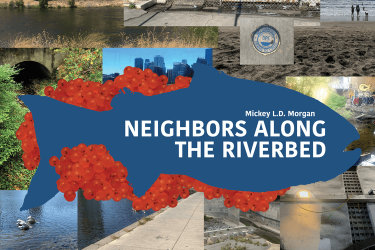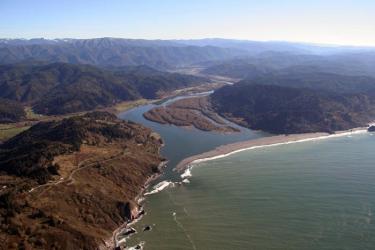As we approach 2019, we want to highlight several important year-end items for the West Coast Groundfish Fishery.
The items covered in this public notice are:
- What do I do if the government shuts down?
- 2019 harvest specifications and management measures; and compliance guide
- Corrections to LEFG and OA Minor Nearshore Rockfish trip limit
- Corrections to Shorebased IFQ Allocations for Canary Rockfish and Shortspine
- Thornyheads N. of 34°10' N. latitude
- Correction to 150-fathom Coordinates around San Miguel Island
- Individual fishing quota (IFQ) fishing into the new year
- IFQ quota pound allocations
- IFQ vessel account reminders
- 2019 quota share permits
- Trawl gear regulation changes and compliance guide that includes correction
- Bycatch Reduction Engineering Program federal funding opportunity
- Cost recovery fee percentages for 2019
Need More Information?
Regulations, compliance guides, program applications, and vessel limits, are available on the NOAA Fisheries West Coast Groundfish Fishery website and IFQ Account Website.
Subscribe to the groundfish email group.
What Do I Do if the Government Shuts Down?
Annual funding for part of the federal government (including NOAA Fisheries) will expire on December 21 at midnight (EST), unless Congress comes to agreement on funding beyond that date.
In the event of a government shutdown:
- You can continue to fish.
- 2019 harvest specifications and the trawl gear regulation changes will be in effect on January 1.
- IFQ allocations for 2019 will be available on January 1. Additional information on vessel accounts and quota share and permits is included in this notice.
- West Coast Region Groundfish Branch and Permits Branch staff WILL NOT be available to answer questions about permits or fishing regulations. Please use our website to obtain information, or the eCFR to view the regulations for the groundfish fisheries.
- The West Coast Groundfish Observer Program is still running. Please continue to follow your standard observer notification procedures. You must still take an observer if you are selected.
- You must still make a declaration prior to starting to fish or prior to switching to a different type of trawl gear for vessels fishing under the Trawl Rationalization Program:
- How to Make a Declaration (1-888-585-5518)
- Other Resources:
2019 Harvest Specifications and Management Measures
We recently announced a final rule for new groundfish harvest specifications and management measures for 2019-2020 on December 12, 2018. These management measures include trip limits, season dates, bag limits, and depth limits to ensure the sustainable commercial and recreational harvest of these species. A correction notice for this rule will publish on December 27, 2018. Both are effective January 1, 2019. In the event of a shutdown, the correction notice can be located on the Federal Register webpage.
We are correcting the following items:
- Swapping coordinates number 282 and 283 for the 150-fathom line (around San Miguel Island) to prevent a cross-over;
- Correcting the Shorebased IFQ allocations for canary rockfish and shortspine thornyheads north of 34°27' N. latitude; and
- Correcting the LEFG and OA trip limits so that blue/deacon rockfish is NOT included in the sublimit for black rockfish within the Minor Nearshore Rockfish limit between 42° N. latitude and 40°10' N. latitude.
| IFQ Species | Area | 2019 Shorebased Trawl Allocation (mt) | 2020 Shorebased Trawl Allocation (mt) |
|---|---|---|---|
| Canary rockfish | Coastwide | 953.6 | 894.3 |
| Shortspine thornyhead | North of 34°27'N. lat. | 1,506.8 | 1,493.5 |
A compliance guide explaining the changes from 2018 in plain language is available.
IFQ Fishing Into the New Year
If you are planning to fish during the last days of 2018 and the offload is not completed until a 2019 date, the discards and landings will be debited against your 2019 vessel account, even if the discards and target species harvests actually occurred in 2018. We will debit your vessel account based on the offload year reported on the electronic fish ticket.
IFQ Quota Pound Allocations
We allocated quota pounds to your 2019 quota share accounts. You can view these balances by logging into your QS account and changing the "Quota Year" to 2019. On January 1, 2019, these pounds will become transferable to vessel accounts for fishing in 2019. You will need to login and transfer quota pounds to a vessel account. If you have issues logging into your account, please contact the Permit Office (Matt Dunlap or Justin Kavanaugh) at 206-526-4353.
Please note: Pacific halibut and Pacific whiting are managed under international treaties. The allocations for Pacific halibut and Pacific whiting are decided annually by an international body, so the sector trawl allocations for those species are interim amounts until the U.S. harvest amount is announced in the Federal Register, usually in March and May respectively. If applicable, you will receive additional quota pounds for those species at that time. There may also be a tribal reapportionment of Pacific whiting to the trawl sectors in the fall.
IFQ Vessel Account Reminders
We sent vessel owners who successfully renewed their vessel account online by the November 30, 2018, deadline an approved renewal receipt by mail. Some vessel owners did not renew their vessel account for 2019. Please remember that you cannot fish in the IFQ fishery without a valid, renewed 2019 vessel account. If you are unsure whether your vessel account is renewed, please contact the Permits staff at 206-526-4353.
Here are a few basic vessel account reminders:
- If the ownership of your vessel changes, you must request a new vessel account.
- You cannot fish in the IFQ fishery if your vessel account has a deficit for any IFQ species. All vessel owners/captains should check their vessel account balance before every IFQ trip.
- You can find a list of IFQ species and management areas can be found on the NOAA Fisheries Trawl Catch Share Program website.
- IFQ vessels must have an observer aboard unless you are operating under an electronic monitoring exempted fishing permit (EFP), and must land their fish to a first receiver with a valid first receiver site license. You may check the list of licensed first receivers at any time by visiting the Public Permit Website and clicking on "First Receiver Site Licenses".
- We will post updated shorebased IFQ vessel limits table on the NOAA Fisheries Catch Share website.
- If you identify a discrepancy in your vessel account between catch monitor and first receiver data, please contact LoriJesse, PSMFC Catch Monitor Program Coordinator at 503-595- 3282 (ljesse@psmfc.org). Similarly, if you identify a discrepancy in your vessel account involving your discard data, please contact Neil Riley, NOAA Fisheries Observer Program, 206-861- 7607. You can also call the Permit Office at 206-526-4353 regarding discrepancies in your vessel account.
2019 Quota Share Permits
We mailed 2019 Quota Share Permits in mid-December. The permit will reflect your QS balances for all IFQ and Individual Bycatch Quota (IBQ) species as of December 1, 2018.
Trawl Gear Regulation Changes
We published a final rule to revise restrictions on bottom and midwater trawl gear for vessels fishing under the Trawl Rationalization Program. The changes are effective January 1, 2019
The revisions provide vessels operators increased flexibility in how they can use and configure trawl gear. This should increase access to target stocks and efficiency of fishing practices, while still limiting bycatch to meet the conservation objectives of the Trawl Rationalization Program.
We will publish a correction notice for this rule on December 27, 2018. In the event of a shutdown, you can view the correction notice on the Federal Register webpage. The notice corrects language describing where vessels are prohibited from carrying any other type of small footrope trawl gear other than selective flatfish trawl gear (SFFT); restores language which clarifies the trawl gear types vessels are allowed to carry simultaneously on a trip; restores the prohibition on the use of small footrope trawl inside the Columbia and Klamath River Salmon Conservation Zones; and restores vessel declarations for non-trawl and open access groundfish trips, open access trips for other fisheries, and other trip types.
A plain-language compliance guide explaining the revisions to the trawl gear restrictions that will be effective January 1 is available.
Bycatch Reduction Engineering Program Federal Funding Opportunity
NOAA Fisheries announced the availability of approximately $2.5 million for projects that increase collaborative research and partnerships for innovation in bycatch reduction. Proposals should focus on the high-priority areas below.
High-priority areas for Fiscal Year 2019 projects include:
- Developing innovative and effective technologies; gear modifications; avoidance programs and techniques; and/or improved fishing practices in commercial and recreational fisheries and aquaculture to reduce bycatch impacts.
- Improving understanding and reduction of post-release and other indirect mortality, including barotrauma, predation, and unaccounted mortality in commercial and recreational fisheries and aquaculture. This includes target and non-target species of fish or protected species. Proposals addressing this priority may be projects that specifically test descending devices or identify high-priority release and discard mortality needs and provide baseline information for important discarded species (in particular, but not limited to red snapper, Atlantic cod, striped marlin, etc.).
- Developing techniques to reduce interactions between fishing gears and corals, sponges, and other structure-forming invertebrates. Proposals that specifically reduce impacts to essential fish habitats, deep-sea coral sites, and endangered tropical corals.
- Conducting comprehensive international bycatch analyses or research that will inform conservation engineering in U.S. commercial, recreational, and aquaculture fisheries.
Find out more about the application process and schedule.
See the list of 2018 grant awards.
For more background, check out our National Bycatch Reduction Strategy.
Questions? Contact Wendy Morrison, Acting Branch Chief for Domestic Fisheries at (301) 427-8500.
Cost Recovery Fee Percentages for 2019
We will publish the 2019 cost recovery fee percentages in the Federal Register on December 26, 2018. In the event of a shutdown, you can view the correction notice on the Federal Register webpage.
This notice sets the fee percentages and Mothership pricing to be used when paying 2019 cost recovery fees and is applicable starting on January 1, 2019.
For the calendar year 2019, NOAA Fisheries announces the following fee percentages by program:
- 2.9 percent for the Shorebased Individual Fishing Quota Program;
- 0 percent for the Mothership Co-op Program;
- 0 percent for the Catcher/Processor Co-op Program.
For 2019, the Mothership pricing to be used as a proxy by the Catcher/Processor Co-op Program is $0.07/lb for Pacific whiting.
For more information contact Chris Biegel, West Coast Region Cost Recovery Coordinator at (503) 231-6291, christopher.biegel@noaa.gov.

